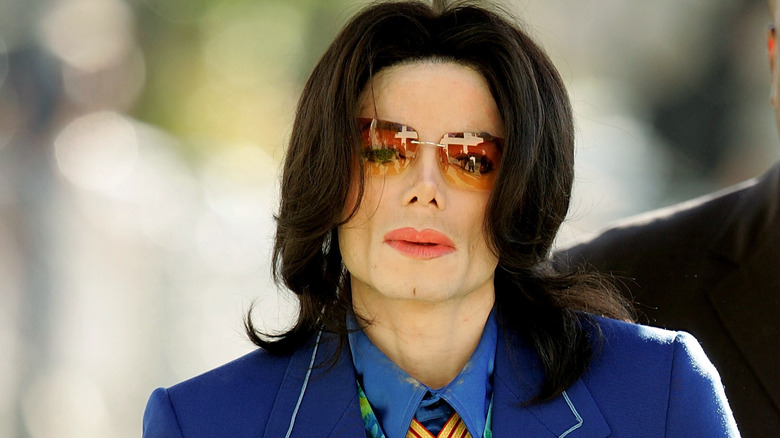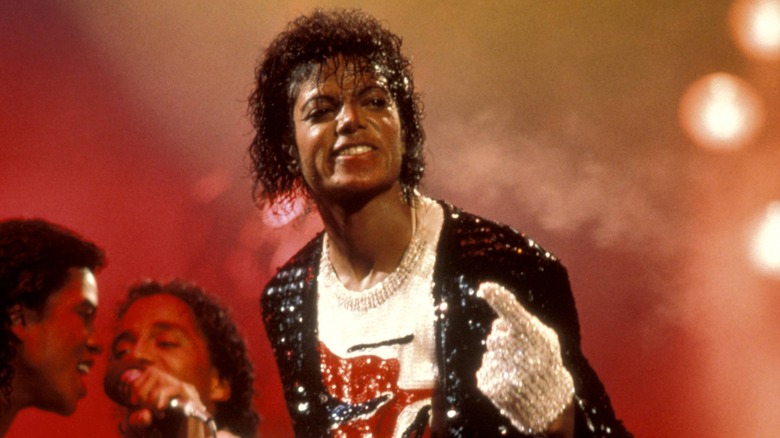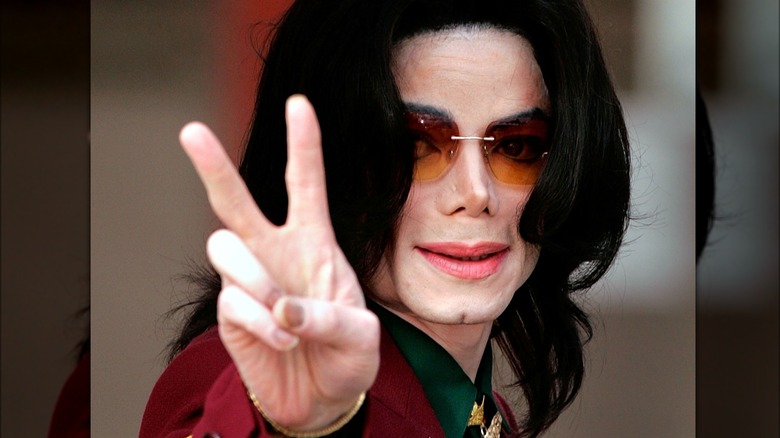The Sad Facts Discovered In Michael Jackson's Autopsy Report
Only days after Michael Jackson's death in June 2009, disturbing facts were discovered before his autopsy report was released. A source who claimed to see the "Beat It" singer's body told the Sun that the singer only weighed 112 pounds at the time of his death, and that he was completely bald except for some "peach fuzz" on his head (via Us Weekly). That report was denied by the Los Angeles County coroner, but unnerving details about Jackson's autopsy were revealed during his wrongful death trial in May 2013.
The lawsuit was filed by the Jackson family against the pop star's touring company AEG Live for hiring Dr. Conrad Murray — who had prescribed Jackson the narcotics which ultimately led to his death. While testifying at that trial, the coroner who performed Jackson's autopsy, Dr. Christopher Rogers, said the "Thriller" artist's lips were tattooed pink, per CNN. Also, Rogers said Jackson had tattooed eyebrows and a portion of his scalp black. The coroner confirmed that the singer suffered from "vitiligo, a skin pigmentation disease," which altered portions of his skin to appear white. Perhaps the most alarming fact about the tragic final months of Jackson was that his death should have been avoided.
Dr. Rogers said that Jackson died from an overdose of propofol — a drug used as an anesthetic, which the singer used as a sleep aid — and that he could have lived much longer if not for the overdose. Sadly, the incident that led to Jackson's baldness also contributed to his drug abuse.
Michael Jackson's hair caught fire filming a Pepsi commercial
This article includes mentions of addiction.
A detective who worked for the Los Angeles Police Department spoke about the condition Michael Jackson's body was in at the time of his death, and how he was surprised to find out the "Billie Jean" singer was bald. "Looking at his scalp, the top of his head had been severely scarred," LAPD Detective Scott Smith said in the 2019 documentary "The Killing of Michael Jackson" (via the Mirror). As mentioned in Jackson's autopsy, he had tattooed part of his head black. This was to assist in wearing wigs. "[He had] hardly any hair at all on the sides," Detective Smith added. A contributing factor to Jackson's baldness was the injuries he suffered filming a Pepsi commercial in 1984.
Part of the scarring that the detective mentioned was sustained when Jackson's hair caught fire from pyrotechnics while filming the Pepsi ad. "I never saw anything like that in my life," Karen Faye, a makeup artist who was on the set, testified in court afterwards, per Yahoo! News. "All his hair was gone and there was smoke coming out of his head," she added.
Almost a decade after the tragic incident, the "Will You Be There" singer underwent reconstructive surgery on his scalp. He was prescribed painkillers for recovery and became addicted to the narcotics. "The medications were used sparingly at first," Jackson said in a recorded statement in 1993 as he cancelled his "Dangerous" tour, per the Los Angeles Times. That was not the end of Jackson's substance abuse problem.
Did Michael Jackson give himself the fatal propofol dose?
As covered, Michael Jackson died from an overdose of propofol. His doctor at the time, Dr. Conrad Murray, was convicted of involuntary manslaughter in November 2011 for the death of the King of Pop. In October 2013, Murray was released after serving two years of his four-year sentence. According to Murray, he tried to stop Jackson from abusing the anesthetic drug. "So what I told Michael is that we have to get you off that substance," the doctor said while appearing on Australia's "60 Minutes" in November 2013, shortly after his release (via ABC News). "However, I mean, to call it ideal or non-ideal, Michael Jackson is not a guy you can just say, 'Stop it,'" he added.
Around the same time of that interview, Murray also spoke at length to the Daily Mail about the night Jackson died. The doctor claimed that he had given the "Smooth Criminal" artist a few drugs "including valium and lorazepam" but he did not want to give Jackson propofol to help him sleep. Ultimately, Murray said he gave the singer a "minuscule" 25mg dose. "They found tablets in his stomach. I didn't give him those. Michael took extra tablets. And he injected himself," Murray told the Daily Mail. Murray claimed he was not responsible for administering the fatal dose. "I believe he woke up, got hold of his own stash of propofol and injected himself," the doctor told the outlet.
If you or anyone you know needs help with addiction issues, help is available. Visit the Substance Abuse and Mental Health Services Administration website or contact SAMHSA's National Helpline at 1-800-662-HELP (4357).



